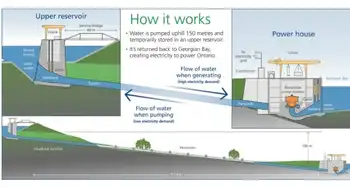WA $600 Electricity Credit supports households with power bills as a budget stimulus, delivering an automatic rebate via Synergy and Horizon, funded by the Bell Group settlement to aid COVID-19 recovery and local spending.
Key Points
A one-off $600 power bill credit for all Synergy and Horizon residential accounts, funded by the Bell Group settlement.
✅ Automatic, not means-tested; applied to Synergy and Horizon accounts.
✅ Can offset upcoming bills or carry forward to future statements.
✅ Funded by Bell Group payout; aims to ease cost-of-living pressures.
Washington Premier Mark McGowan has announced more than a million households will receive a $600 electricity credit on their electricity account before their next bill.
The $650 million measure will form part of Thursday's pre-election state budget, similar to legislation to lower electricity rates in other jurisdictions, which has been delayed since May because of the pandemic and will help deflect criticism by the opposition that Labor hasn't done enough to stimulate WA's economy.
Mr McGowan made the announcement on Sunday while visiting a family in the electorate of Bicton.
"Here in WA, our state is in the best possible position as we continue our strong recovery from COVID-19, but times are still tough for many West Australians, and there is always more work to do," he said.
"[The credit] will mean WA families have a bit of extra money available in the lead up to Christmas.
"But I have a request, if this credit means you can spend some extra money, use it to support our local WA businesses."
The electricity bill credit will be automatically applied to every Synergy or Horizon residential account from Sunday, echoing moves such as reconnections for nonpayment by Hydro One in Canada.
It can be applied to future bills and will not be means tested.
"The $600 credit is fully funded through the recent Bell Group settlement, for the losses incurred in the Bell Group collapse in the early 1990s," Mr McGowan said.
"It made sense that these funds go straight back to Western Australians."
In September, the liquidator for the Bell Group and its finance arm distributed funds to its five major creditors, including $670 million to the WA government. The payment marked the close of the 30-year battle to recover taxpayer funds squandered during the WA Inc era of state politics.
The payout is the result of litigation stemming from the 1988 partnership between then Labor government and entrepreneur Alan Bond in acquiring major interests in Robert Holmes à Court’s failing Bell Group, following the 1987 stock market crash.
WA shadow minister for cost of living, Tony Krsticevic, said the $600 credit was returning money back into West Australian's pockets from "WA Labor's darkest days".
“This is taxpayers’ money out of a levy which was brought in to pay for Labor’s scandalous WA Inc losses of $450 million in the 1980s,” he said.
“This money should be returned to West Australians.
“WA families are in desperate need of it because they are struggling under cost of living increases of $850 every year since 2017 under WA Labor, amid concerns elsewhere that an electricity recovery rate could lead to higher hydro bills.
“But they need more than just a one-off payment. These $850 cost of living increases are an on-going burden.”
Prior to the onset of the coronavirus pandemic, the opposition believed it was gaining traction by attacking the government's increases to fees and charges in its first three budgets, and by urging an electricity market overhaul to favor consumers.
Last year, Labor increased household fees and charges by $127.77, which came on top of increases over the prior two budgets, as other jurisdictions faced hydro rate increases of around 3 per cent.
According the state's annual report on its finances released in September, the $2.6 billion budget surplus forecast in the at the end of 2019 had been reduced by $920 million to $1.7 billion despite the impact of the coronavirus.
But total public sector net debt was at $35.4 billion, down from the $36.1 billion revision at the end of 2019 in the mid-year review.
Related News












